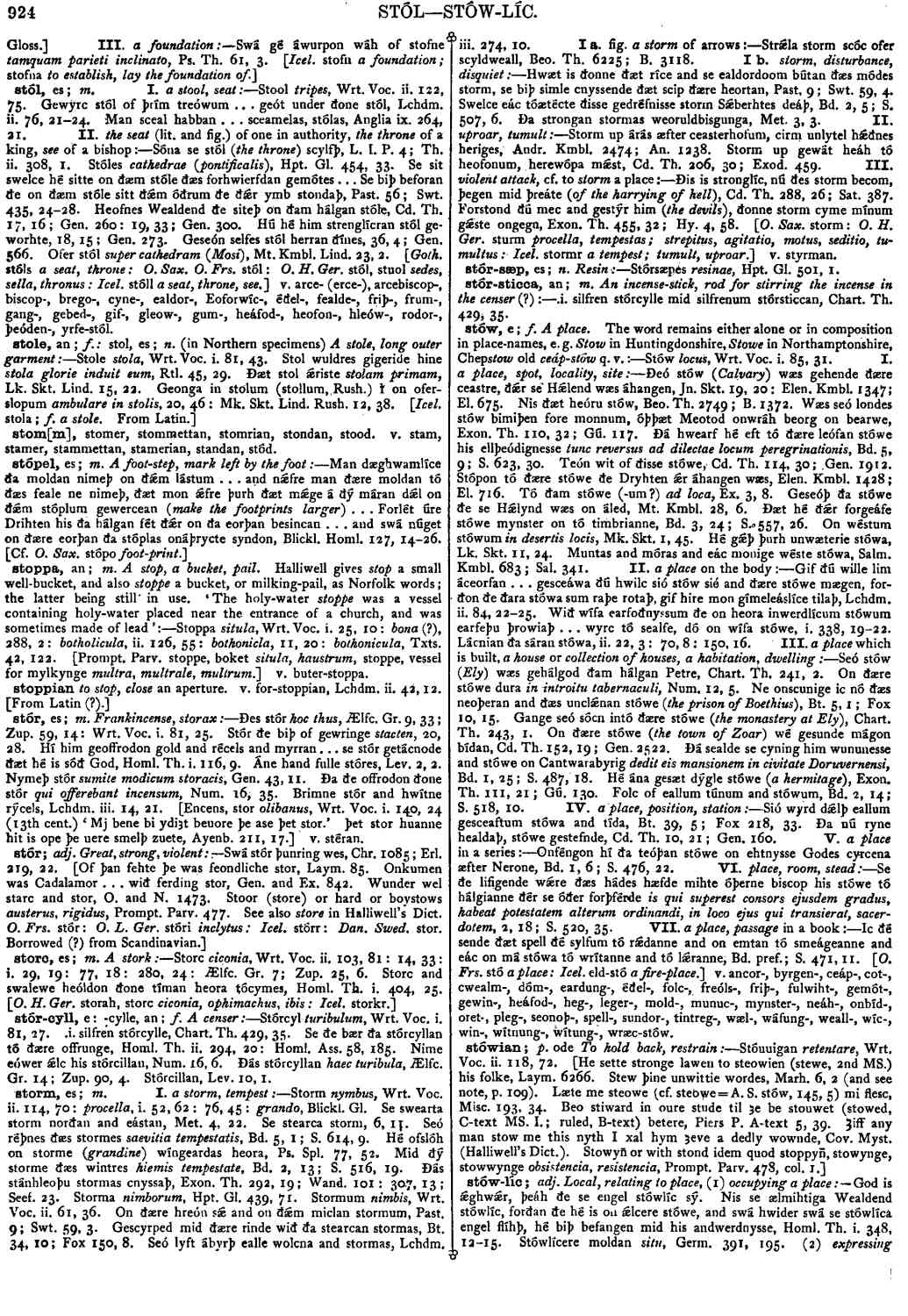stów
- noun [ feminine ]
-
Stów
locus,
- Wrt. Voc. i. 85, 31.
-
Ðeó stów (
Calvary
) wæs gehende ðære ceastre, ðǽr se Hǽlend wæs áhangen,- Jn. Skt. 19, 20 : Elen. Kmbl. 1347 ; El. 675.
-
Nis ðæt heóru stów,
- Beo. Th. 2749 ; B. 1372.
-
Wæs seó londes stów bimiþen fore monnum, óþþæt Meotod onwráh beorg on bearwe,
- Exon. Th. 110, 32 ; Gú. 117.
-
Ðá hwearf hé eft tó ðære leófan stówe his ellþeódignesse
tunc reversus ad dilectae locum peregrinationis,
- Bd. 5, 9 ; S. 623, 30.
-
Teón wit of ðisse stówe,
- Cd. Th. 114, 30 ; Gen. 1912.
-
Stópon tó ðære stówe ðe Dryhten ǽr áhangen wæs,
- Elen. Kmbl. 1428 ; El. 716.
-
Tó ðam stówe (-um ?)
ad loca,
- Ex. 3, 8.
-
Geseóþ ða stówe ðe se Hǽlynd wæs on áled,
- Mt. Kmbl. 28, 6.
-
Ðæt hé ðǽr forgeáfe stówe mynster on tó timbrianne,
- Bd. 3, 24 ; S. 557, 26.
-
On wéstum stówum
in desertis locis,
- Mk. Skt. 1. 45.
-
Hé gǽþ þurh unwæterie stówa,
- Lk. Skt. 11. 24.
-
Muntas and móras and eác monige wéste stówa,
- Salm. Kmbl. 683 ; Sal. 341.
-
Gif ðú wille lim áceorfan . . . gesceáwa ðú hwilc sió stów sié and ðære stówe mægen, for*-*ðon ðe ðara stówa sum raþe rotaþ, gif hire mon gímeleáslíce tilaþ,
- Lchdm. ii. 84, 22-25.
- Wið wífa earfoðnyssum ðe on heora inwerdlícum stówum earfeþu þrowiaþ . . . wyrc tó sealfe, dó on wífa stówe, i. 338, 19-22.
- Lácnian ða sáran stówa, ii. 22, 3 : 70, 8 : 150, 16.
-
Seó stów (
Ely
) wæs gehálgod ðam hálgan- Petre, Chart. Th. 241, 2.
-
On ðære stówe dura
in introitu tabernaculi,
- Num. 12, 5.
-
Ne onscunige ic nó ðæs neoþeran and ðæs unclǽnan stówe (
the prison of Boethius
),- Bt. 5, 1 ; Fox 10, 15.
-
Gange seó sócn intó ðære stówe (
the monastery at Ely
),- Chart. Th. 243, 1.
-
On ðære stówe (
the town of Zoar
) wé gesunde mágon bídan,- Cd. Th. 152, 19 ; Gen. 2522.
-
Ðá sealde se cyning him wununesse and stówe on Cantwarabyrig
dedit eis mansionem in civitate Doruvernensi,
- Bd. 1, 25 ; S. 487, 18.
-
Hé ána gesæt dýgle stówe (
a hermitage
),- Exon. Th. 111, 21 ; Gú. 130.
-
Folc of eallum túnum and stowum,
- Bd. 2, 14 ; S. 518, 10.
-
Sió wyrd dǽ;lþ eallum gesceaftum stówa and tída,
- Bt. 39, 5 ; Fox 218, 33.
-
Ða nú ryne healdaþ, stówe gestefnde,
- Cd. Th. 10, 21 ; Gen. 160.
-
Onféngon hí ða teóþan stówe on ehtnysse Godes cyrcena æfter Nerone,
- Bd. 1, 6 ; S. 476, 22.
-
Se ðe lifigende wǽre ðæs hádes hæfde mihte óþerne biscop his stówe tó hálgianne ðér se óðer forþférde
is qui superest consors ejusdem gradus, habeat potestatem alterum ordinandi, in loco ejus qui transierat, sacerdotem,
- 2, 18 ; S. 520, 35.
-
Ic ðé sende ðæt spell ðé sylfum tó rǽdanne and on emtan tó smeágeanne and eác on má stówa tó wrítanne and tó lǽranne,
- Bd. pref. ; S. 471, 11.
Bosworth, Joseph. “stów.” In An Anglo-Saxon Dictionary Online, edited by Thomas Northcote Toller, Christ Sean, and Ondřej Tichy. Prague: Faculty of Arts, Charles University, 2014. https://bosworthtoller.com/29086.
Checked: 0